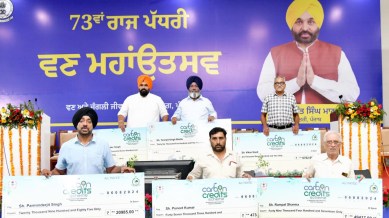Stay updated with the latest - Click here to follow us on Instagram
In a first, Punjab farmers take home cheque worth Rs 1.75 cr as carbon credit compensation
3,686 farmers from Hoshiarpur, Ropar, Mohali, Pathankot, and Nawanshahr registered under `45-cr pilot project

Farmer Parminderjit Singh Cheema, of village Pur Hiran in Hoshiarpur, Tuesday received a cheque of Rs 20,985 from Punjab Chief Minister Bhagwant Mann. It is the first installment out of the total four that the Punjab government will pay him as carbon credit compensation.
Similarly farmer Navjinder Singh from Saleran village received a cheque of Rs 94,772. Ram Pal and Punit Kumar, from Chak Sadhu, received Rs 49,417 and Rs 47,386, respectively, while Dr Vikas Sood got Rs 6,702.
These payments are part of the pilot project that covers 3,686 farmers across Kandi region including Hoshiarpur, Ropar, Mohali, Pathankot, and Nawanshahr. The project will disburse a total of Rs 45 crore in carbon credit compensation in four installments to these registered farmers. On Tuesday, Mann disbursed Rs 1.75 cores into the accounts of 818 farmers of Hoshiarpur during an event to mark 73rd Van Mahotsav at Hoshiarpur.
monthly limit of free stories.
with an Express account.
In a significant step towards environmental sustainability and farmer welfare, Punjab’s Forest Department, in collaboration with The Energy and Source Institute (TERI) and an international company, has launched a pioneering carbon credit compensation programme. Under this initiative, farmers are receiving financial compensation for planting and maintaining trees on their agricultural land, contributing to CO2 reduction and benefiting from an additional income stream.
The programme requires farmers to plant trees and maintain them for at least five years to be eligible for carbon credit. After this period, the trees can be sold, providing farmers with income. If these trees are sold to paper making, furtniture making and plywood making factories, then they are also helping in storing carbon in furniture and paper products, thereby preventing additional pollution, which could be caused through burning timber.
In case of Parminderjit Singh Cheema, he grows tress on his 17 acres farm land instead of doing traditional wheat and paddy cultivation. He plants eucalyptuses and poplar trees in rotation. The trees get mature for harvesting in 5-6 years, when he cuts them down and plants the new batch.
“This initiative not only helps reduce carbon emission, but also provides farmers with the opportunity to earn from their trees after five years, by selling them and by continuing to receive carbon credit payments. Also, we farmers are practicing intercropping for the first three years in the fields where tree plants are grown, making extra income. This dual approach offers immediate agricultural benefits and long-term financial gains,” said Cheema.
Mann said Punjab is the country’s first state to launch the carbon credit scheme to preserve the environment and check global warming. He also highlighted its potential to enhance environmental sustainability, control pollution, and provide economic benefits to farmers. He emphasized the need for wider awareness and participation in such programs to maximize their impact.
“The initiative aims to create a sustainable model that benefits both the ecosystem and the farming community,” said Dr SanjeevTiwari, Forest Conservator of the North Circle. He added that farmers who had grown tree plants in 2016-17, 2017-18 and so on are enrolled under this programme.
Teams from the international company and TERI visit the farms to inspect the Verified Emission Reductions (VER) to calculate compensation based on the quality and duration of the trees.
Dr Sood, who grows tress on 18 acres of land, emphasized that the carbon credit payments help cover the costs of plantation and maintenance, providing significant relief to farmers. However, he stressed the need for greater awareness of the scheme to encourage more farmers to adopt agro-forestry practices. This will help address environmental imbalances and control diseases related to pulmonary health, he said.
Punjab, with its forest cover at just 6.6 percent—well below the minimum required 20 per cent—faces significant challenges. The extensive cultivation of water-intensive paddy crop has led to a drastic decline in the water table, while overuse of fertilizers, insecticides, and pesticides has polluted the soil and air. The state urgently needs crop diversification, making it an ideal candidate for agro-forestry. The National Forest Policy aims to increase the country’s green cover to 33 percent.
Farmers involved in agro-forestry note that the rainy season is optimal for planting trees. Agro-forestry requires 80-90 per cent less pesticides, insecticides, and fertilizers compared to traditional crops, and its water consumption is less than 20 per cent of that required for paddy. After two to three years, the trees primarily rely on rainwater. Additionally, agro-forestry requires less labor compared to other crops and significantly improves soil quality. According to experts, trees such as poplar, safeda, dek, subabul, and kikar can be successfully integrated with main crops in Punjab’s climate conditions.
Earlier, Mann gave a clarion call to people to take up tree plantation as mass movement for checking environmental pollution on one hand and enhancing the state’s green cover on other. Highlighting severe environmental damage caused by deforestation, Mann said by reckless cutting of trees, human beings have created havoc with nature.
“Owing to this only, we are witnessing a lot of natural fury across the country,” said Mann, adding the only solution for this is to plant more and more trees.
Mann also appealed to the farmers, who get free electricity to plant at least four saplings around their tubewells. He said this is currently a suggestion, but a law can also be enacted in this regard if needed.